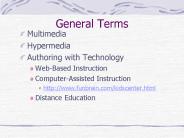Mindtools PowerPoint PPT Presentations
All Time
Recommended
Worked in Binet's laboratory (IQ test) Constructivism--Children have real ... Simple, powerful formalism. Easily learnable. Mindtools: Examples. Advantages: ...
| PowerPoint PPT presentation | free to view
Constructivist learning experienced through use of mindtools to solve a problem.
| PowerPoint PPT presentation | free to download
Believed -- communicating content to students will result in learning ... Technology as Cognitive Tools: Learners as Designers by David H. Jonassen http: ...
| PowerPoint PPT presentation | free to view
The discovery of the alphabet will create forgetfulness in the ... semblance of truth; they will be the hearers of many things and they will learn nothing. ...
| PowerPoint PPT presentation | free to view
The discovery of the alphabet will create forgetfulness in the ... Jonassen: http://www.quasar.ualberta.ca/edpy485/edtech/mindtool.htm. Examples of Mindtools ...
| PowerPoint PPT presentation | free to view
Mindtools for Geography Teachers
| PowerPoint PPT presentation | free to view
Browsed by user in self-selected sequence. Different users experience it differently ... Consider audience, content, relationships (structure & links), interface ...
| PowerPoint PPT presentation | free to view
Microsoft Excel. Is categorized as a mindtool because: It motivates the ... Excel ... 5. Students will use Excel to experiment with model. 6. Students will ...
| PowerPoint PPT presentation | free to view
... learners, energized learners and teachers, no more memorization of trivia. ... It is not easy to help students in the former condition to move to patterns of ...
| PowerPoint PPT presentation | free to download
Learning Environments for the 21st Century: Students, ... Reflective Journaling. Team Projects. E-portfolio. November 15, 2003. Powering Up, 2003: Mindtools ...
| PowerPoint PPT presentation | free to download
Tutorials. Intelligent tutorials. Drill and Practice. Electronic Ditto Sheets ... Tutorials. Provide remedial instruction. Incorrect responses resulted in more ...
| PowerPoint PPT presentation | free to view
Extensive and includes cases that cover variations in concepts and laws. Syntonic. A sense of harmony, possesses resonance, builds in intensity to reach stability ...
| PowerPoint PPT presentation | free to view
Benefits include compactness & speed. Components. Design tools. Data storage ... Field = data about a single property. Record = data about a single object ...
| PowerPoint PPT presentation | free to view
Spreadsheet formulas. Typically start with = Contain. Numerical values ... Mathematical, logical, text. FUNCTION(argument[, argument]) Argument is range or list ...
| PowerPoint PPT presentation | free to view
For more classes visit www.snaptutorial.com Read "What is Leadership?" and watch the embedded video on the Mindtools website.
| PowerPoint PPT presentation | free to download
Authoring with Technology Web-Based Instruction ... Major thinking skills that learners need to use as designers (Multimedia & Hypermedia as Mindtools) ...
| PowerPoint PPT presentation | free to download
My background: math & physics teacher, school headmaster, MSc in educational ... Self-study (excercises, reflection, mindtools) Individual assignments ...
| PowerPoint PPT presentation | free to view
Assessing critical and higher order thinking skills is difficult, but is it not ... in the Classroom: Mindtools for critical thinking, Prentice Hall, New Jersey. ...
| PowerPoint PPT presentation | free to view
Assessing critical thinking. Critical thinking is context-dependent ... Critical thinking skills are stabel. Changes will require time and multiple uses of mindtools ...
| PowerPoint PPT presentation | free to view
__We are dedicated to helping you exceed your career goals
| PowerPoint PPT presentation | free to download
__We are dedicated to helping you exceed your career goals
| PowerPoint PPT presentation | free to download
We are dedicated to helping you exceed your career goals
| PowerPoint PPT presentation | free to download
__We are dedicated to helping you exceed your career goals
| PowerPoint PPT presentation | free to download
__We are dedicated to helping you exceed your career goals
| PowerPoint PPT presentation | free to download
For more course tutorials visit www.newtonhelp.com Respond to the following prompts in 75 to 100 words each. 1. What are three group theories? How do these theories differ from one another?
| PowerPoint PPT presentation | free to download
For more course tutorials visit www.newtonhelp.com Respond to the following prompts in 75 to 100 words each. 1. What are three group theories? How do these theories differ from one another?
| PowerPoint PPT presentation | free to download
For more course tutorials visit www.newtonhelp.com Respond to the following prompts in 75 to 100 words each. 1. What are three group theories? How do these theories differ from one another?
| PowerPoint PPT presentation | free to download
For more course tutorials visit www.newtonhelp.com Respond to the following prompts in 75 to 100 words each. 1. What are three group theories? How do these theories differ from one another?
| PowerPoint PPT presentation | free to download
We are dedicated to helping you exceed your career goals
| PowerPoint PPT presentation | free to download
For more course tutorials visit www.newtonhelp.com Respond to the following prompts in 75 to 100 words each. 1. What are three group theories? How do these theories differ from one another?
| PowerPoint PPT presentation | free to download
For more course tutorials visit www.newtonhelp.com Respond to the following prompts in 75 to 100 words each. 1. What are three group theories? How do these theories differ from one another?
| PowerPoint PPT presentation | free to download
FOR MORE CLASSES VISIT www.soc110cart.com Respond to the following prompts in 75 to 100
| PowerPoint PPT presentation | free to download
For more course tutorials visit www.newtonhelp.com Respond to the following prompts in 75 to 100 words each. 1. What are three group theories? How do these theories differ from one another?
| PowerPoint PPT presentation | free to download
For more course tutorials visit www.newtonhelp.com Respond to the following prompts in 75 to 100 words each. 1. What are three group theories? How do these theories differ from one another?
| PowerPoint PPT presentation | free to download
For more course tutorials visit www.newtonhelp.com Respond to the following prompts in 75 to 100 words each. 1. What are three group theories? How do these theories differ from one another?
| PowerPoint PPT presentation | free to download
FOR MORE CLASSES VISIT www.soc110cart.com Respond to the following prompts in 75 to 100 words each. 1. What are three group theories? How do these theories differ from one another? 2. What are
| PowerPoint PPT presentation | free to download
We are dedicated to helping you exceed your career goals
| PowerPoint PPT presentation | free to download
For more course tutorials visit www.newtonhelp.com Respond to the following prompts in 75 to 100 words each. 1. What are three group theories? How do these theories differ from one another?
| PowerPoint PPT presentation | free to download
SOC 110 CART We are dedicated to helping you exceed your career goals
| PowerPoint PPT presentation | free to download
We are dedicated to helping you exceed your career goals
| PowerPoint PPT presentation | free to download
__We are dedicated to helping you exceed your career goals
| PowerPoint PPT presentation | free to download
FOR MORE CLASSES VISIT www.soc110cart.com Respond to the following prompts in 75 to 100 words each. 1. What are three group theories? How do these theories differ from one another? 2. What are
| PowerPoint PPT presentation | free to download
FOR MORE CLASSES VISIT www.soc110cart.com Respond to the following prompts in 75 to 100 words each. 1. What are three group theories? How do these theories differ from one another? 2. What are the different types of groups that fall under the primary and secondary group categories? What are the goals of each type of group? 3. What are 3 to 4 examples of effective
| PowerPoint PPT presentation | free to download
For more course tutorials visit www.newtonhelp.com Respond to the following prompts in 75 to 100 words each. 1. What are three group theories? How do these theories differ from one another?
| PowerPoint PPT presentation | free to download
For more course tutorials visit www.tutorialrank.com Respond to the following prompts in 75 to 100 words each. 1. What are three group theories? How do these theories differ from one another?
| PowerPoint PPT presentation | free to download
FOR MORE CLASSES VISIT www.soc110cart.com Respond to the following prompts in 75 to 100 words
| PowerPoint PPT presentation | free to download
FOR MORE CLASSES VISIT www.soc110cart.com Respond to the following prompts in 75 to 100 words each. 1. What are three group theories? How do these theories differ from one another? 2. What are
| PowerPoint PPT presentation | free to download
__We are dedicated to helping you exceed your career goals
| PowerPoint PPT presentation | free to download
FOR MORE CLASSES VISIT www.soc110cart.com Respond to the following prompts in 75 to 100
| PowerPoint PPT presentation | free to download
For more course tutorials visit www.newtonhelp.com Respond to the following prompts in 75 to 100 words each. 1. What are three group theories? How do these theories differ from one another?
| PowerPoint PPT presentation | free to download
We are dedicated to helping you exceed your career goals
| PowerPoint PPT presentation | free to download
For more course tutorials visit www.newtonhelp.com Respond to the following prompts in 75 to 100 words each. 1. What are three group theories? How do these theories differ from one another?
| PowerPoint PPT presentation | free to download
FOR MORE CLASSES VISIT www.soc110cart.com Respond to the following prompts in 75 to 100 words each
| PowerPoint PPT presentation | free to download
FOR MORE CLASSES VISIT www.soc110cart.com Respond to the following prompts in 75 to 100 words
| PowerPoint PPT presentation | free to download
FOR MORE CLASSES VISIT www.soc110cart.com Respond to the following prompts in 75 to 100 words each. 1. What are three group theories? How do these theories differ from one another? 2. What are
| PowerPoint PPT presentation | free to download
FOR MORE CLASSES VISIT www.soc110cart.com Respond to the following prompts in 75 to 100 words
| PowerPoint PPT presentation | free to download
























































